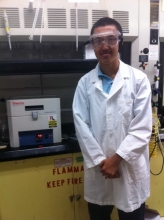
University:
Major:
Mentor(s):
Faculty Sponsor(s):
Faculty Sponsor's Department:
Project Title:
Project Description:
The thermoelectric material that can directly convert heat into electrical power is considered to play a significant role in fully utilizing the tremendous waste heat in industry and daily life. Its energy conversion efficiency is evaluated by the figure of merit, ZT, which is defined by the equation:
ZT=((S2σ)/κ)T
where S is Seebeck coefficient; σ, κ are electrical and thermal conductivity respectively; T is the absolute temperature. Apparently, a high ZT material requires high S and σ, but low κ. However, the largest challenge in improving ZT is that those three parameters are correlative.
This problem is expected to be solved by incorporating a mesoporous structure, which contains both nano-scaled pores and crystallized framework, into the material. The nano-scaled pores are able to scatter the phonons efficiently to decrease the thermal conductivity, and a continuous framework is able to maintain a high electrical conductivity. In addition, a high Seebeck coefficient is considered to be achieved by controllable doping. For example, doping appropriate amount of Se into Bi2Te3 is expected to enhance the Seebeck coefficient significantly. In this work, as one typical thermoelectric material at low temperature range, Se-doped Bi2Te3 with mesopores was synthesized by using silica nanospheres as template and doped via a vapor transfer route. The optimized sample exhibits a high Seebeck coefficient of -158 μV/ K, and an estimated ZT of 0.7 at room temperature. Overall, this developed synthetic route to the mesoporous structure provides a new method to obtain a great improvement of ZT for thermoelectric materials.
